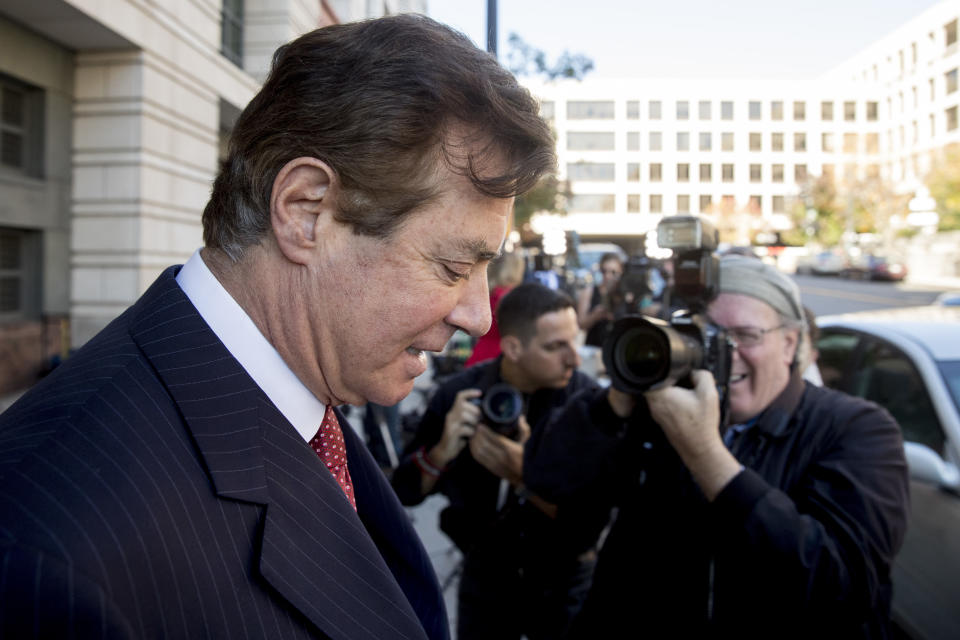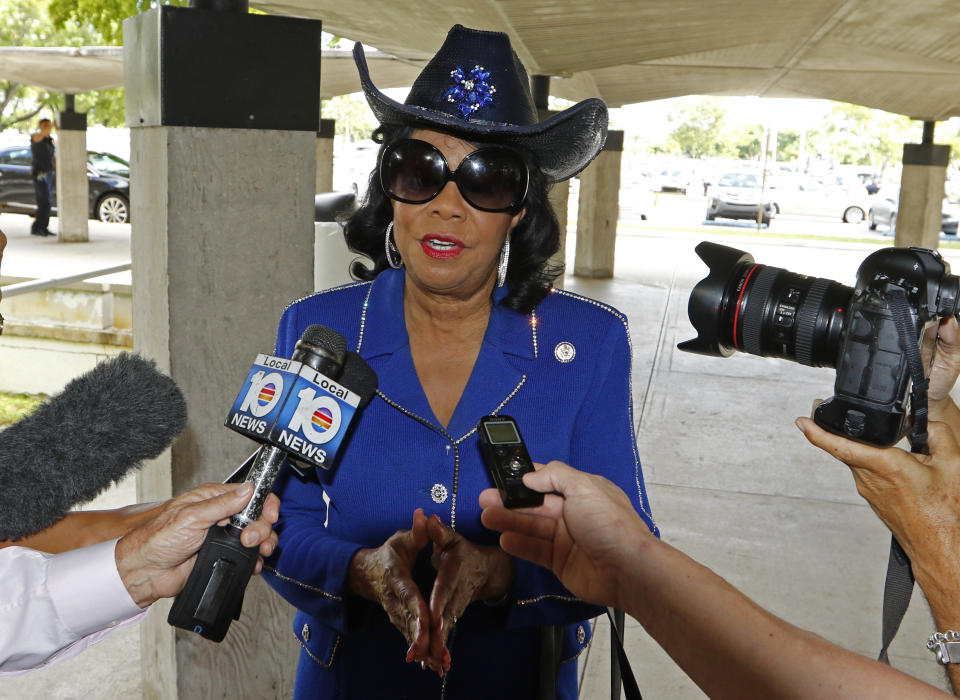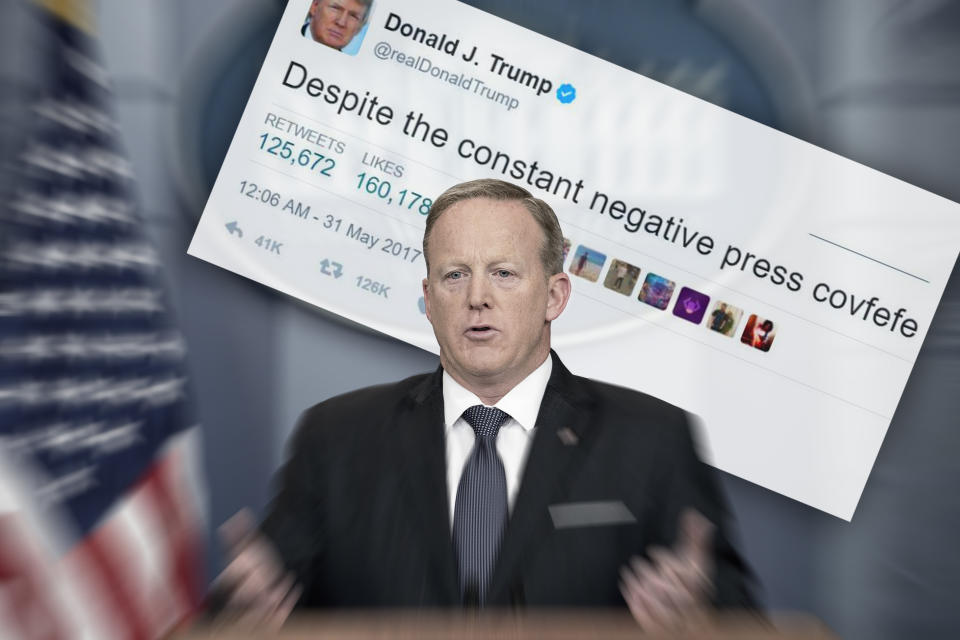Eight stories the White House couldn't keep straight
Media fact checking is a relatively new phenomenon, but presidential misstatements, to put it politely, have a long history. Go back as far as you like and pick whichever party you’d prefer, and you’ll have plenty of obfuscations, omissions and creative spins on the facts to cite. But the Trump administration appears to be in a class by itself in this regard, at least in recent presidential history. While never quite admitting error, the White House has had to issue a number of clarifications and elaborations, on matters both serious and trivial. Here are a few of the occasions in 2017 when White House officials had trouble keeping their stories straight.
_____
The Comey firing

President Trump fired FBI Director James Comey on May 9, while Comey’s agency was investigating the Trump campaign for possible collusion with Russia. After hiding in the White House lawn bushes, then-press secretary Sean Spicer emerged to say that Comey had been fired on the recommendation of Deputy Attorney General Rod Rosenstein. Per Spicer, Rosenstein had looked into the job performance of Comey on his own before sending a letter to the White House criticizing the director’s handling of the investigation into Hillary Clinton.
“It was all him,” Spicer said of Rosenstein, according to the Washington Post, as a reporter repeated his answer back to him. “That’s correct — I mean, I can’t, I guess I shouldn’t say that, thank you for the help on that one. No one from the White House. That was a [Department of Justice] decision.”
The next day White House spokesperson Sarah Sanders altered the story, stating that Trump had actually planned on firing Comey for a while but did so after Rosenstein’s letter. A day later, Trump contradicted his own administration, telling NBC News in an interview that he was going to fire Comey regardless of what Rosenstein had said.
“Oh, I was going to fire, regardless of recommendation,” Trump told Lester Holt. “He made a recommendation, he’s highly respected — very good guy, very smart guy. And the Democrats like him, Republicans like him. He made a recommendation, but regardless of recommendation, I was going to fire Comey.”
A week later Rosenstein told a group of senators that he knew Comey was going to be fired regardless of what he put in his memo, completing the walk-back of Spicer’s initial claim.
_____
The largest crowd

Spicer did not have the strongest start to his time as press secretary. On Trump’s first full day as president, Spicer was dispatched by his boss to insist that the crowd the previous day was “the largest audience to witness an inauguration, period.” Aerial photos of the event compared with both inaugurations for Barack Obama clearly showed otherwise, and the data — both in official estimates and in public transportation use — indicated the same. Trump called the National Park Service personally in order to find proof that his crowd size was larger, but none existed. The disagreement between the White House and the NPS led to a monthslong investigation by the agency’s inspector general, which found no improprieties in the Park Service actions.
_____
Jared Kushner’s difficulty with forms

Trump put a lot of responsibility on his son-in-law from the start, placing the real estate heir in charge of everything from solving the Israel-Palestinian conflict to reorganizing the federal government with business school savvy. Kushner has yet to achieve any of those goals. He’s also struggled with accurately filling out the paperwork necessary to work for the federal government. After initially submitting the SF-86, Kushner had to update it in April to include a meeting with Russian ambassador Sergey Kislyak, a misstep his lawyer called an “error.” The errors continued, with Kushner eventually supplementing the list three times with 100 additional foreign contacts. Democrats asked for Kushner’s security clearance to be revoked, and the heat turned up as reports surfaced that he and wife Ivanka Trump were using a private email server and that his family was attempting to sell visas in China. The head of the government bureau that processes background checks said in regard to the White House adviser’s forms that he had “never seen that level of mistakes,” which is potentially problematic because the forms warn that those who submit false information could be charged with a federal crime and face up to five years in prison.
Kushner wasn’t the only one to have a bout of amnesia when filling out forms. Treasury Secretary Steve Mnuchin initially failed to disclose nearly $100 million in assets while neglecting to mention his role as director at an investment fund in a tax haven.
_____
Manafort’s ‘very limited role’

As investigations into Russia’s potential effect on the 2016 election turned to Paul Manafort, Spicer wanted to make it clear that the lobbyist and operative did not play a prominent role in the campaign. “Obviously there’s been discussion of Paul Manafort, who played a very limited role for a very limited amount of time,” said Spicer during a March 20 briefing.
Manafort was the chairman of the Trump campaign, a position he held from May to August 2016, although former campaign manager Corey Lewandowski told the Associated Press that Manafort was in operational control of the campaign starting April 7.
_____
The curious case of the vice president

Since Trump became president-elect, there are two ways to look at Mike Pence’s public statements about the campaign’s potential ties to Russia, which have had to be corrected on several points. The explanation by Pence and his staff is that the former congressman and governor was in the dark about a number of issues. But Democratic lawmakers investigating the 2016 campaign are asking questions about what exactly Pence knew, and when.
In interviews, Pence initially dismissed the idea that former national security adviser Mike Flynn had discussed lifting sanctions on Russia with Russian Ambassador Kislyak. Flynn has since admitted that the subject did come up, however, and Pence’s office has said the vice president was simply misled by Flynn, who also lied to the FBI. But Pence has also pleaded ignorance about law enforcement looking into other shady deals potentially involving Flynn. The New York Times reported that Flynn told the transition team that he was under investigation for his work for the government of Turkey two weeks before he was nominated to his extremely sensitive post. An administration official told CNN that despite running the transition team, Pence wasn’t aware until March.
Pence also dismissed the idea that the campaign had any ties to WikiLeaks, telling Fox News in October 2016 that “nothing could be further from the truth.” In November, the Atlantic published a series of direct messages between Donald Trump Jr. and the WikiLeaks Twitter account that occurred two months before the election, proving there had at least been some contact. Pence’s team released a statement saying he had just learned of the communication with the release of the story. So far the strategy of pleading ignorance seems to be keeping Pence out of special counsel Robert Mueller’s sights, but some legislators are seeking answers about the specifics of what Pence knew and when.
_____
Frederica Wilson

The deaths of four U.S. service members in Niger spun into a weeklong controversy that damaged the credibility of chief of staff John Kelly. After initially avoiding an extended statement on the deaths, Trump declared that previous presidents hadn’t contacted gold star families, a statement immediately refuted by members of prior administrations. Rep. Frederica Wilson, D-Fla., then stated that the family of Sgt. La David Johnson found some of the comments Trump made to them in his call to be disrespectful. The president called Wilson a liar and said he had proof, but Johnson’s family supported her account.
Kelly, a gold star father whose son died in Afghanistan, was then called in to defend Trump. The general attacked Wilson’s character, misrepresenting a speech she had given in 2015 to portray her as a showboating publicity seeker. Video of Wilson’s speech showed Kelly was wrong, but the White House didn’t back down. Kelly said he stood by his statement and would “absolutely not” apologize. Sanders said it was “highly inappropriate” to question Kelly in any way because he was a four-star Marine general.
_____
Godwin’s law in the briefing room

Godwin’s law states that the longer an online conversation goes, the more likely someone will eventually be compared to Hitler. This does not usually apply to the White House briefing room, but 2017 was not a usual year. In an April briefing, Spicer turned to the genocidal German leader when discussing a gas attack in Syria, saying, “You had someone as despicable as Hitler, who didn’t even sink to using chemical weapons.” Considering Hitler’s regime used poison gas to murder millions of people in concentration camps, a reporter offered Spicer the opportunity to clarify. He made it worse, saying “[Hitler] was not using the gas on his own people in the same way that [Syrian President Bashar] Assad was doing.”
Following the briefing, Spicer issued a second clarification in a statement to NBC News, saying, “In no way was I trying to lessen the horrendous nature of the Holocaust. However, I was trying to draw a contrast of the tactic of using airplanes to drop chemical weapons on innocent people.” It was pointed out that using the term “innocent people” to describe Syrian victims could be seen as implying that Holocaust victims were not innocent. He then issued a third clarification, amending the final line to read “draw a contrast of the tactic of using airplanes to drop chemical weapons on population centers.”
_____
Covfefe

In May, the president posted a short, sweet, late-night tweet that read, “Despite the constant negative press covfefe.” The apparent typo of “coverage” lingered for a few hours before being deleted, with Trump adding “Who can figure out the true meaning of “covfefe” ??? Enjoy!” That would have been that, save for Spicer’s apparent conclusion that it was unacceptable to admit that the president had simply mistyped. “The president and a small group of people know exactly what he meant,” said Spicer when asked about it at the daily briefing, an unnecessarily cryptic response. The mystery surrounding covfefe was thankfully short-lived, but the White House’s response will stand as its most pointless cover-up.
_____
Best of 2017 Yahoo News Features




